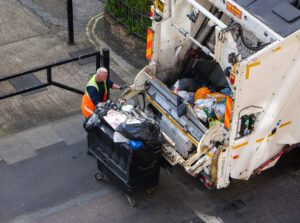The ESA has written to the new CEO of the Environment Agency, Philip Duffy, to warn of the cost of inaction on waste crime and setting out proposals for tackling it.
The below open letter was sent to Philip Duffy from ESA Chairman, Gavin Graveson and was co-authored by Eunomia Research and Consulting.
Dear Philip,
Congratulations on your appointment as Chief Executive of the Environment Agency (EA). We warmly welcome you to the position and look forward to working closely with you in your role as the regulator of the waste sector. As the Environmental Services Association (ESA), we are committed to supporting you and the EA in helping the legitimate waste sector thrive whilst protecting the natural environment.
Waste crime is big business, and we believe that its impact on the sector is the worst it has ever been. It is now essential that we work together to use all of the powers available to you and EA officers to stop illegal activity as quickly as possible. We are keen to work with you to help tackle the criminality blighting our sector.
Your predecessor, Sir James Bevan, referred to waste crime as “the new narcotics” (Gov.uk, 2022). Its severity and impact are still not yet fully understood, but it is clear that criminals are making huge profits at the expense of legitimate operators. This undermines the sector’s investment in new infrastructure and the pursuit of higher standards – which ultimately underpin the UK’s transition to a circular economy.
The Environment Agency’s own recent National Waste Crime survey published on 6 July 2023 highlights that a fifth of all waste produced – 34 million tonnes – is perceived to be managed illegally, and there is little evidence of it decreasing. Respondents to the survey also highlight that whilst the EA is seen as a knowledgeable organisation, it needs more resources to be able to provide an effective response, given the scale of the problem.
Reflecting the severity of the situation, we have commissioned and published three comprehensive reports over the last decade with Eunomia, highlighting the extent of waste crime and its impact on the economy and environment. Eunomia has helped research content for this letter and our recent research with them forecasted that known waste crime costs England about £1bn annually (ESA and Eunomia, 2021). In reality, the figure is likely to be substantially higher than this.
Despite this knowledge, the situation has not improved and has in fact, been deteriorating. In a BBC podcast which delved into the ‘criminal underworld’ of waste crime, Dan Ashby described waste crime as:
“Low-risk for criminals and you’re being paid to do the crime. It’s an extraordinarily brilliant business” (BBC, 2023)
The National Audit Office (NAO) corroborated the view that waste crime costs are growing. The NAO highlighted that, the more waste crime is investigated, the bigger the problem it is revealed to be, as more incidents are identified (NAO, 2022). As such, reported statistics and official data understate the true extent and scale of the issue. Additionally, following a 2018 independent review into serious and organised crime, it was revealed that over the preceding years, organised crime groups were more involved in waste crime, partly due to the market’s increased attractiveness and the low barriers to entry (NAO, 2022).
The prevalence and magnitude of this issue indicates the risk of detection and threat of penalty is not a sufficient disincentive to commit waste crime. Indeed, the Public Accounts Committee (PAC) reported that the approach to large parts of waste crime is closer to decriminalisation and that fines were just seen as a business expense (PAC, 2022). They noted that much waste crime is responded to with a minimal, or entirely absent enforcement response: fewer incidents are investigated, investigations are taking longer, and advice and guidance or warning letters are the most common responses for most types of waste crime with the numbers of prosecutions falling 90% since 2007 (PAC, 2022). We would suggest that this is an unacceptable situation and it is imperative that more effective enforcement outcomes are achieved.
The Government outlined in the Environmental Improvement Plan (EIP) a hugely ambitious target of eliminating waste crime by 2043 (HM Government, 2023). Given the current approach and resources dedicated to tackling waste crime, this simply cannot be achieved. However, the ESA is ready to support you in improving the EA’s approach and encourages the increase of dedicated resources to help you meet this target.
The Economic Gains of Waste Crime
Waste is more valuable than ever before. The increasing use of policy and legislation to drive waste away from cheap landfill to further up the waste hierarchy has meant that a lorry of waste is worth at least £2,000. Thirty years ago, an equivalent load would have cost £200. It is, therefore, more important than ever that enforcement action consistently succeeds in reducing the potential for economic gain, and does so in a timely manner. We have encountered some egregious examples of where poor enforcement outcomes have occurred – these are shown in Annex 1.
A Call for Action
Adequate resources must be put towards tackling waste crime
Beyond the moral case for enforcement, there is a clear economic case for increased enforcement resourcing. In our 2014 report, we estimated that every £1 of Government spending on tackling waste crime brings an estimated return of £4.4, over £3 of this directly input back into the public purse (ESAET, 2014). This was validated in a report commissioned by the EA, which calculated that every additional £1 spent on tackling waste crime would yield, on average, £4.96 back into the legitimate economy (EA, 2020).
In 2021/22, just £10m was specifically ringfenced by the EA to tackle waste crime, despite waste crime having an estimated annual cost of £1bn. It is painfully clear that insufficient money is being spent to tackle waste crime. The £10m of ringfenced funding also stands in stark contrast the £50m spent regulating waste activities via permits and registrations (EA, 2022). This disparity clearly deprives the EA of the ability to focus on the activities that are causing the most harm.
We are now in critical need for a dramatic increase in the funding available to tackle waste crime. We understand that there are powers within Section 64 of the Environment Act 2021 for the EA to raise fees from permit holders to combat illegal waste sites. As an industry, we are willing to provide additional revenue for the EA to tackle waste crime and encourage the EA to utilise this power. If further funding from other sources is needed, we support the EA in its efforts to determine and secure the total amount of funding needed to tackle waste crime.
More effective enforcement is needed
The EA has significant powers in relation to regulating the waste sector. It acts as the regulator, investigator, and prosecutor. It is vital that it fully utilises these powers as well as receiving effective external scrutiny to ensure appropriate use.
The ESA has a broad range of members, covering most of the waste market. As such, we have unique and practical insights into the enforcement powers implemented by the EA, as well as the impacts of these enforcement activities. This is yet another reason why we are keen – and well-placed – to support you in tackling waste crime.
Our member’s perception is that it takes far too long to close down blatantly illegal activity, with protracted routes to enforcement and insufficient use of available powers. This means that illegal activity can continue to operate and receive large quantities of waste, even whilst enforcement cases are being built, causing environmental problems as well as depriving legitimate operators of businesses. For example, whilst the EA has the power to essentially ‘lock the gates’ of known illegal sites, and to crush vehicles used in waste crime, we are aware these powers have only been utilised a handful of times since they were implemented.
By contrast, legitimately operated and well-run permitted facilities are susceptible to quickly accumulating non-compliance scores for very minor technical breaches of permit conditions. These are often associated with no (or very little) environmental impact, but can result in significantly increasing the level of permit subsistence fees on the legitimate operator.
There is also a perception amongst legal experts within ESA’s membership, that the EA takes quite a risk averse approach to prosecution of illegal activities, resulting in fewer prosecutions and significant delays in getting cases to court. Where prosecutions are successful, they often result in insufficient penalties, which provide little deterrent to offenders – as also noted by both the PAC inquiry and the NAO report.
There is also concern that the EA is not making full and proper use of the sentencing guidelines, and that the failure to achieve the recommended sentences is the result of the EA prosecutions applying the guidelines incorrectly when presenting cases.
It is important that EA officers receive adequate training to help to achieve more stringent and appropriate sentences, and ensure that cases don’t fail on technicalities before they even get to court, which unfortunately happens far too often.
Regulatory reform must be fast tracked
We recognise that increased funding is not the only action required to tackle waste crime. As part of our previous research, we provided recommendations divided into four broad themes to address the significant factors leading to waste crime:
- modernise the regulatory regime;
- improve enforcement efforts;
- develop secure sources of enforcement funding; and
- improve cross-regulatory cooperation and awareness raising.
In response to our published recommendations, Defra and the EA liaised with industry to prioritise action on waste crime. One of the key developments is the creation of the Joint Unit for Waste Crime. Despite this, little progress has been made on many of the recommendations since they were shared.
For example, in May 2017, we recommended that the waste carrier, broker, dealer registration system should be reformed. Despite good engagement on the issue, we have yet to see reform implemented. We recognise that Defra is responsible for the change, however, we encourage strong pressure from the EA to influence government.
A summary of our previous recommendations and their current progress is included in Annex 2.
We need to improve the measurement of waste crime
The EA currently uses a single metric on its corporate scorecard to measure waste crime – the number of high-risk illegal waste sites. However, this is not a satisfactory measure of waste crime, as it does not clearly relate to the impact of waste crime.
We have therefore called for new metrics. In particular, we would like metrics that consider the scale and duration of waste crime. Some of the key themes we would expect to be reported include:
- Metrics which capture all types of waste crime – This will show what types of waste crime are increasing or decreasing;
- An assessment of the quantities and types of waste involved in each case of waste crime – This will provide better information of the scale of waste crime; and
- The time taken by the EA from detection to stop each reported case of waste crime. – This will provide reassurance that the EA are acting quickly and effectively.
Working Together
The situation you inherit must be addressed. Despite years of discussion, sufficient additional resources and reform have not followed. The impact of waste crime is no closer to being resolved – to the detriment of our members, your officers, and beyond.
We are currently at a crossroads and inaction will let the industry drift further into the hands of criminals. We want to work with you to vigorously drive out illegal activity from the sector, which in turn will help members of the ESA and other legitimate operators across the sector, to both deliver a circular economy in England and protect the natural environment. As Chairman of the ESA I would welcome the opportunity to meet with you at the earliest opportunity to discuss this pressing issue in more detail.
Yours sincerely, Gavin Graveson Chairman of the Environmental Services Association (ESA)
This letter was co-authored by Eunomia Research and Consulting Ltd.




